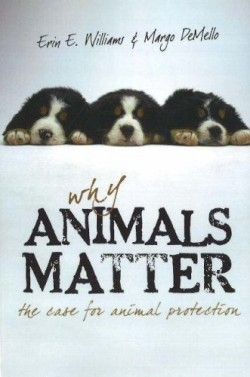Why Animals Matter
The Case for Animal Protection
Ten thousand years ago the human connection to animals changed when people began domesticating them for food and labor, establishing dominance and control. Today humans still hold to that supremacy despite growing proof that animals aren’t dumb beasts.
The plight of animals has grown worse since industrialization. As agribusinesses increasingly abuse animals, the authors write, so “we are stripped of some of what makes us human: our sense of right and wrong, and our ability to show compassion to those who are less powerful than we are.”
Animals endure exploitation in all the animal-use industries. Factory farm poultry live abbreviated lives confined to overcrowded cages. Their feet never touch soil, and urine and feces drop through wire floors to collect underneath. This refuse creates toxic fumes that contaminate the air, creating health hazards for workers while runoff pollutes fields and rivers.
Both authors are animal protection advocates. DeMello lectures at Central New Mexico Community College, directs administration of the House Rabbit Society and has written three books, including Stories Rabbits Tell. Williams learned to care about animals on her family’s dairy farm and now works for the Humane Society of the United States.
Despite the majority of Americans’ distaste for killing animals for sport, hunting groups use political influence to their advantage. Trophy hunters receive generous tax breaks by having the animals they’ve shot appraised before “donating” them to nonprofit museums, often a building on their own property. Congress has tried since 1995 to pass bills outlawing most canned hunting in the United States, but well-funded hunting organizations have lobbied to defeat them.
Canned hunting farms guarantee success to hunters who pay to stalk exotic animals within fenced areas. The addax, a nonnative antelope brought into the United States for this purpose is considered endangered in its natural habitat of North Africa. Here they are bred for killing and found primarily in canned hunting operations.
The authors ask readers, “Just because we can do all this, should we?”
The burgeoning pet industry supports consumers’ need for companion animals but sometimes mistreats them for greater profit. Government oversight of zoos, circuses, film, television, rodeos, and racing often fails to protect the animals used in these entertainments.
Repetition of facts occasionally distracts the reader, but each chapter ends with a list of practical suggestions to mitigate animal abuse and Web sites that support advocacy.
The authors write of failures, but they also highlight successes. Pending bills in California and other states would mandate better care of pet store animals. Most promising is the trend among retailers not to sell animals in their stores at all. Readers will learn from this book that animals do matter and that people who care can help create more success stories.
Reviewed by
Margaret Cullison
Disclosure: This article is not an endorsement, but a review. The publisher of this book provided free copies of the book to have their book reviewed by a professional reviewer. No fee was paid by the publisher for this review. Foreword Reviews only recommends books that we love. Foreword Magazine, Inc. is disclosing this in accordance with the Federal Trade Commission’s 16 CFR, Part 255.

